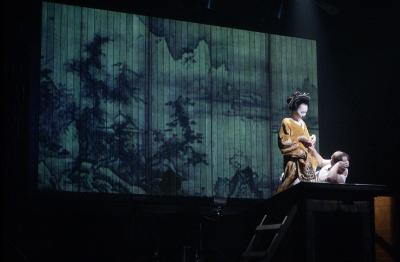SEARCH
REVIEWS
FEATURES
NEWS
Etcetera and
Short Term Listings
LISTINGS
Broadway
Off-Broadway
BOOKS and CDs
OTHER PLACES
Berkshires
London
LA/San Diego
Philadelphia
Elsewhere
QUOTES
On TKTS
LETTERS TO EDITOR
FILM
LINKS
MISCELLANEOUS
Free Updates
Masthead
Writing for us
A CurtainUp  London Review
London Review
 London Review
London ReviewThe Dragons' Trilogy
|
I've never been to China. When I was a kid, this was Chinatown. Now it's a parking lot . . . . If you scratch the ground with your nails, you will find water and motor oil. If you dig deeper, you're bound to find bits of porcelain and jade and the foundations of the Chinese families who lived here. And if you dig deeper still, you'll reach China. They might take you for a cat, for you always seem to fall upon your legs.
---- Françoise
|

EmilyShelton and JeanAntoineCharestThe Dragons' Trilogy
(Photo: Erick Labbé)
|
The second act, Red Dragon, follows the two girls, their domestic situations and their misfortunes against the backdrop of events with worldwide significance. A husband who is neither his wife's lover nor his daughter's biological father, a child with a disabling illness and a mother's breast cancer coincide with the broader tragedy of war.
In the final part, White Dragon, some of the fragmentation is reconciled and the action concludes in a cyclical fashion. The Englishman Crawford, now wheelchair-bound, metaphysically returns to his birthplace Hong Kong in death. The children of immigrants encounter each other across language and race barriers: Yukali (Emily Shelton), descended from an absconded American pilot and a geisha killed in Hiroshima meets Françoise's son, the conceptual artist Pierre (Hugues Frenette).
The Barbican's cavernously vast auditorium has been converted into two parallel smaller blocks of seating and thus neutralizes the theatre's usual impersonal immensity. The set is a gravel-filled space with a single lamppost at one end and a wooden booth at the other. The fine grey gravel is trudged across, dug in, and even converted into a zen garden. Images from news clips, of the skies or of details onstage are projected onto a screen at one end and adds texture to the action.
Lepage's famously dreamlike style is simple and understated. The production encompasses the broadest themes imaginable, but in such an unaffected way that it is utterly beguiling. Dances realize prophetic dream sequences or re-enact segments of the narrative in a creative and ingenious way.
At one point, two lovers in army uniform skate around the edge of the stage to the "Skaters' Waltz." As the music grows louder, they are joined by other soldiers and the patriotic, congratulatory send off quickly develops into a destructive march, trampling domestic effects and forcing helpless civilians out of their way.
The actors demonstrate a chameleon versatility with which they unrecognisably adopt different roles. The music (performed by Jean-Sébastien Côté) is hauntingly atmospheric and seamlessly integrated into the action. One particularly poignant song, "Youkali" by Kurt Weill, is full of yearning and lyrical ache for a harmonious world.
This experience will expand your theatrical outlook, making other productions look staid, conventional and mundane. The unique chance to see The Dragons' Trilogy is both a perfect introduction to Lepage's brilliance and an exceptional opportunity for fans to revisit a formative play. The stories are at once human and cosmic, and the far-reaching themes are produced imaginatively and unpretentiously.
This indescribably mesmeric production is a flawless combination of aesthetic majesty and emotional integrity. It will assail your senses, enthral and enchant you.
| THE DRAGONS' TRILOGY
Written by Marie Brassard, Jean Casault, Lorraine Côté, Marie Gignac, Robert Lepage, Marie Michaud Directed by Robert LePage With: Sylvie, Cantin, Jean Antoine Charest, Simone Chartrand, Hugues Frenette, Tony Guifoyle, Eric LeBlanc, Veronika Makdissi-Warren, Emily Shelton Dramaturg: Marie Gignac Original Set Design: Jean-François Couture, Gilles Dubé Costume Design: Marie Chantale Vaillancourt Composer: Robert Caux Music arranged and composed by Jean-Sébastian Côté Lighting: Sonoyo Nishikawa Sound: Claud Cyr Projection Design: Jacques Collin Presented by BITE 05, Barbican in association with Cultural Industry as a part of Young Genius Running time: Five hours twenty five minutes with three intervals Box Office: 0845 120 7554 Booking to 25 September 2005 Reviewed by Charlotte Loveridge based on 16th September 2005 performance at the Barbican Theatre, Silk Street London EC1 (Tube: Barbican) |





